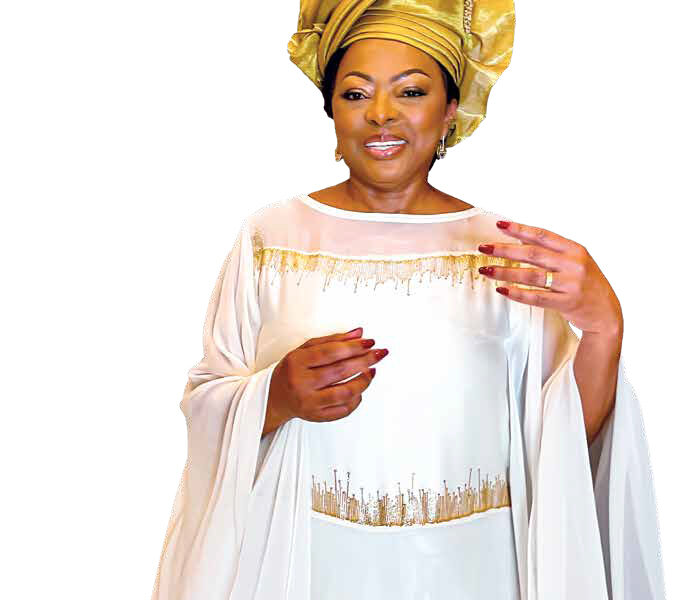«I have dedicated a large part of my career to working for the economic and social transformation of Angola».
Madam First Lady, could you please introduce yourself and share with us your current priorities?
I am Ana Dias Lourenço, a deeply committed citizen, and my political and professional career has always been guided by the desire to defend causes that are close to my heart. I have dedicated a large part of my career to working for the economic and social transformation of Angola. Thanks to my experience in economic planning, investment programming, as well as development and prospective analysis, I have had the opportunity to contribute within the government and multilateral development financing organizations.
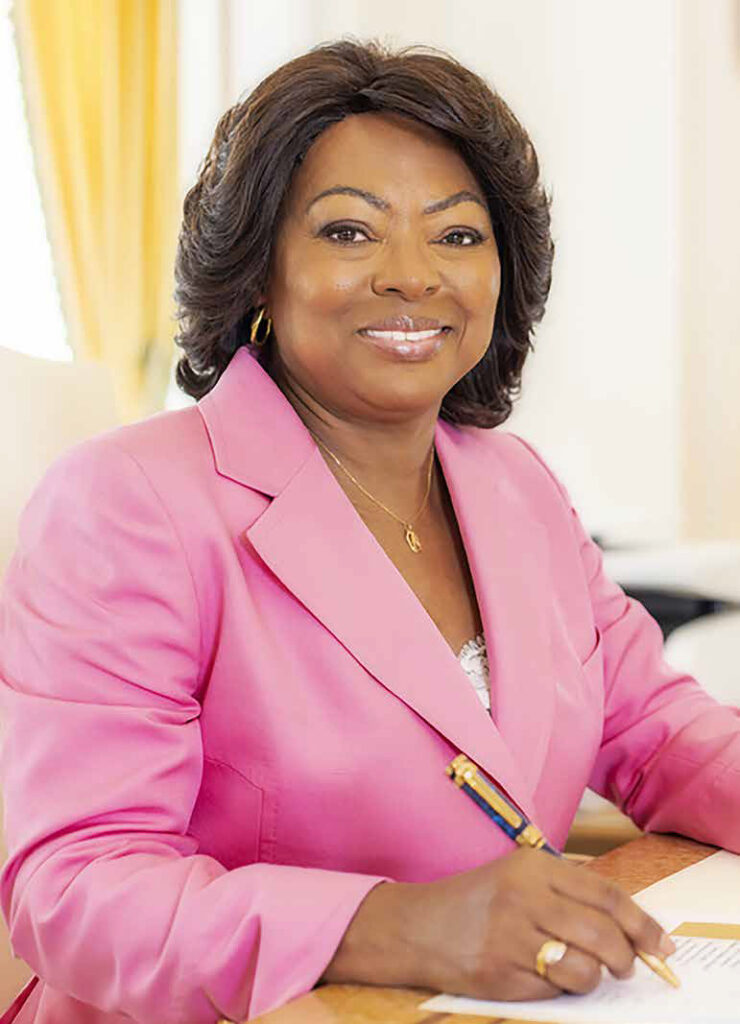
My expertise has allowed me to participate in the implementation of public policies and projects aimed at combating poverty and promoting sustainable development. As First Lady, I place particular emphasis on initiatives aimed at improving the living conditions and well-being of our populations, especially the most vulnerable, such as young women and children.
I am also committed to promoting integrated and sustainable development of communities, especially those in rural areas, in key sectors such as education, health, environment and culture. My goal is to contribute to making Angola a country that every Angolan can be proud of, while preserving our fundamental social and moral values. After years of war, we face significant challenges in social and economic development, particularly in terms of inequality, poverty and access to basic services. These issues are at the heart of my priorities, as they are essential to guaranteeing a better future for all Angolans.
What initiatives has Ana Dias Lourenço put in place to promote women’s rights and combat gender-based violence in Angola?
As First Lady of Angola, my commitment to promoting women’s rights and combating gender-based violence is at the heart of my priorities. I firmly believe that women’s empowerment is essential for truly inclusive and sustainable development. Thus, I support initiatives aimed at strengthening their emancipation in key areas such as education, health, and access to fundamental rights.
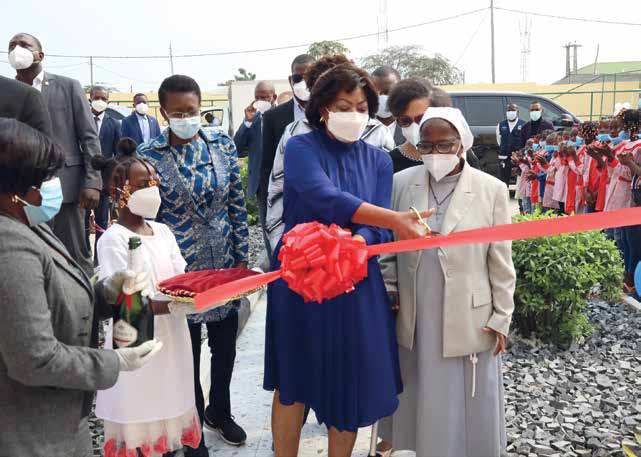
I work closely with non-governmental organizations to raise awareness in society about critical issues such as gender-based violence and women’s reproductive rights. As a woman and mother, I am deeply concerned about the serious violations of women’s and children’s rights, particularly domestic and sexual violence, femicide, child trafficking, and forced marriages. These realities drive me to advocate for stronger justice and more decisive action to protect the most vulnerable.
In this context, I had the honor of participating in the We Are Equal campaign launched by the Organization of African First Ladies for Development (OAFLAD). On November 9, 2024, in Luanda, I had the opportunity to present the theme “Education for Gender Equality and the Fight Against Youth Violence.” This initiative aims to stimulate collective reflection on ways to reduce gender inequalities and encourage concrete actions to eradicate gender-based violence.
What Are the Objectives of This Campaign?
The objectives of this campaign are multiple and aim to:
• Strengthen awareness and the involvement of all sectors of society in promoting gender equality.
• Provide information on legal rights and judicial protections for victims of violence.
• Strengthen support networks and advocate for the swift resolution of legal cases, with strict penalties against all forms of violence.
• Improve victim assistance services in a more integrated and effective manner.
• Increase the involvement of families, schools, government institutions, religious communities, and civil society organizations in combating harmful cultural practices.
• Encourage public denunciation of violence to ensure a safer environment for all.
Through these actions and many others, I am fully committed to advancing the fight for gender equality, strengthening the protection of human rights, and creating a more equitable and secure environment for women, children, and the most vulnerable communities.
Bas du formulaire
What actions has Ana Dias Lourenço taken to promote public health improvement and foster the integrated development of communities in Angola?
As First Lady, public health is one of my key priorities. I am deeply convinced of the importance of ensuring universal access to quality healthcare for all. That is why I have actively supported several health initiatives, such as vaccination campaigns, targeted programs for maternal and child health, and the construction and equipping of basic healthcare infrastructure throughout the country.
In this regard, I also took the initiative to launch the “Free to Shine” campaign, a project aimed at reducing the transmission of HIV from mother to child. Through this commitment, we succeeded in lowering the HIV transmission rate from 26% in 2019 to 15% in 2021, a result that reflects our progress in this fight.

Although the campaign has now concluded, my commitment remains strong and unwavering. I continue to support projects like “Generation AIDS-Free 2030,” which particularly targets young women and children, with a focus on combating the stigma and discrimination associated with HIV. My goal is clear: to reduce the spread of HIV in Angola by 2030.
To achieve this ambitious goal, I am advocating with government authorities, civil society, as well as religious and traditional leaders. All of my efforts are part of a broader framework aimed at offering a healthier future to the next generations, with a particular focus on the most vulnerable groups.
How does the First Lady participate in social transformation in Angola through her initiatives for integrated community development and the promotion of sustainable development?
My commitment goes far beyond social issues. I am deeply involved in integrated community development projects that focus on sustainability and respect for our environment. I strive to promote practices that encourage responsible management of natural resources, mindful of the challenges our society faces.
Angolan society, like others, is confronted with complex challenges. However, I am committed to overcoming the obstacles that may hinder the implementation of our initiatives, whether it is cultural resistance or a lack of resources. With determination and conviction, I fight to overcome these barriers, as I firmly believe that change is possible.
I am convinced that my efforts in support of women’s rights, education, health, and community development, particularly in rural areas, contribute to shaping a better future for our country. These actions are not only aimed at transforming our society but also at inspiring every Angolan to believe in the impact that each individual can have in building our shared future.
Let’s talk about the ‘Tata Uhayele’ project you launched through your Foundation. How does this project contribute to improving community health in Angola?
Through my foundation, ‘Ngana Zenza for Community Development – FDC,’ I have had the honor of launching the ‘Tata Uhayele’ project, a program that carries a simple yet essential message: ‘Take care of your health.’ This project was designed to address the health needs of populations living in remote and hard-to-reach areas, where healthcare facilities are often nonexistent.
The project spans along the Benguela railway, from the Lobito station to Luau, offering a full range of primary healthcare services. We deploy a dynamic team of young healthcare professionals who intervene in various areas, including health promotion and prevention, pediatrics, gynecology and obstetrics, general medicine, ophthalmology, dentistry, nutrition, vaccination, as well as HIV screening services, clinical analysis, and a pharmacy.
For urgent cases requiring specialized care, each stop is supported by an emergency team (INEMA), which provides immediate care and directs patients to the nearest healthcare facilities.
‘Tata Uhayele’ is more than just a project; it is an act of solidarity and humanitarian commitment. We work every day to ensure that even the most isolated regions have access to essential healthcare services.
Could you explain what the ‘Roue de l’Amour’ Platform is, one of your initiatives? How does it contribute to the promotion of education and the empowerment of young people in Angola?
I am pleased to present the ‘Roue de l’Amour’ Platform, an initiative I launched to promote integrated and sustainable development for our youth, particularly girls and children. The name ‘Roue de l’Amour’ was chosen to symbolize this initiative, as it aims to teach children the essential values of affection, respect, and love for others. Our goal is to reach children from a young age, up to 14 years old, instilling in them fundamental social principles that will contribute not only to their personal development but also to the well-being of our nation.
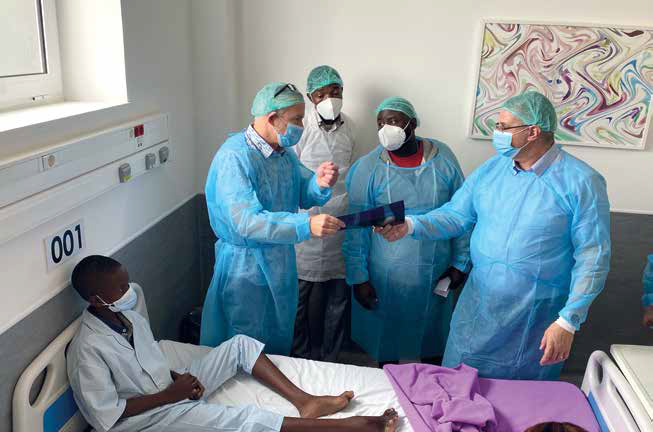
‘Roue de l’Amour’ is not just a platform; it represents a profound and ongoing educational process. For the past eight years, it has been striving to sow the values of family while celebrating our cultural, moral, and civic identity. Through various activities, such as reading, theater, educational games, and more, we provide children with a space conducive to growth and learning the values that will guide them throughout their lives.
What initiatives has the First Lady put in place to promote education, environmental protection, and the empowerment of young people, particularly girls and children?
The First Lady I am deeply committed to projects aimed at improving the well-being of young people, protecting our environment, and promoting the empowerment of girls and children. Among the initiatives we have launched, I would like to highlight the creation of the puzzle ‘Les Gardiens de Mayombe,’ which honors the Mayombe forest and serves to raise public awareness about the importance of preserving our environment, as well as the protection of wildlife and flora in Angola.
At the same time, we have launched educational projects like the book ‘Les Règles de Bases de l’Hygiène – Corps sain, esprit sain’ and ‘Mes 11 copains,’ which illustrate Angola’s commitment to protecting children’s rights.
Another important initiative is the “The Wheel of Love” platform, created as part of an integrated development strategy. It aims to improve the living conditions of young people, with a particular focus on young girls and children. The project seeks to encourage the younger generations to cultivate values of affection, love, solidarity, empathy, and respect for others.
Lastly, I am particularly proud of the “Transform Lives, Be a Woman” program, a platform dedicated to empowering young girls. This program focuses on education, with goals to combat gender inequalities, prevent early pregnancies, and eradicate child marriage. Through this initiative, I am committed to opening new opportunities for girls, enabling them to overcome social obstacles and strengthen their rights for a better future.
What challenges does Angola face in terms of education, and what initiatives have you put in place to improve access to education, particularly for girls and children in rural areas?
In Angola, we face a major challenge regarding access to education, particularly for children aged 12 to 17. Currently, only 44% of these young people have completed their primary education, although school attendance for children aged 6 to 11 reaches a rate of 72%. This situation is particularly concerning for girls, whose attendance rate is much lower (22%) compared to boys (16%), and is even more pronounced in rural areas.
Aware of these issues, I believe it is imperative to work on improving access to quality education, especially for young girls. It is crucial to ensure, by law, universal access to free and quality primary education. I also advocate for measures aimed at motivating our teachers and supporting the most vulnerable families, particularly those living in rural areas, so that they can benefit from an inclusive education system.
I am convinced that initiatives such as the School Lunch Program and Cash Transfers are essential to encourage school attendance and ensure children’s regularity. These programs contribute to improving students’ nutrition and well-being, while fostering their academic success, particularly in the most disadvantaged communities.
What initiatives does First Lady Ana Dias Lourenço support to preserve cultural heritage and empower youth in Angola?
I consider the preservation of cultural heritage as a key element to ensure a promising future for future generations. Culture and art are powerful tools to highlight the identity of Angolans and showcase the diversity of our ethnolinguistic groups.
In this regard, I support several initiatives, including the ‘Kaposoka Symphony Orchestra’ project, an important initiative founded by Mr. Pedro Fançony in 2008. This youth project, born out of the fight against poverty, aims to provide children from disadvantaged backgrounds access to music and ethical teachings. It is primarily focused on diverting these young people from crime by offering them constructive and fulfilling alternatives.
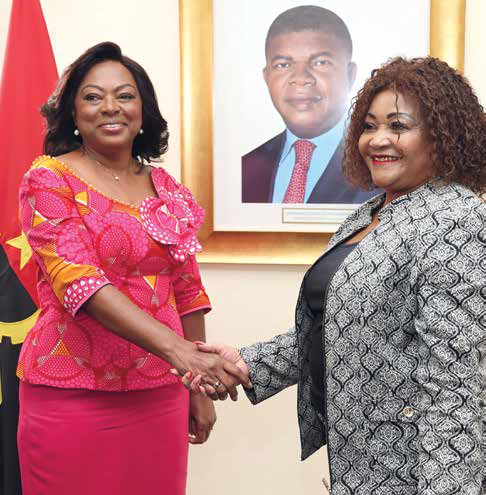
I also support other projects for youth empowerment, such as the creation of the ‘Jangos,’ centers dedicated to learning, recreation, and reflection. These spaces provide a place for dialogue and listening for communities, so they can exchange ideas and find solutions to local challenges. All these initiatives reflect my commitment to promoting the development of youth, offering them opportunities for growth, and contributing to their full integration into Angolan society.
Interview withSamirat Ntiaze in Luanda.

